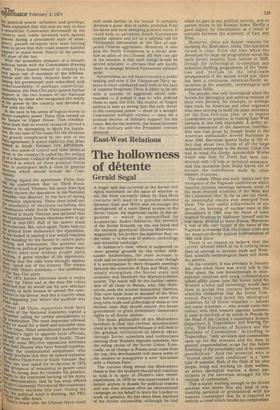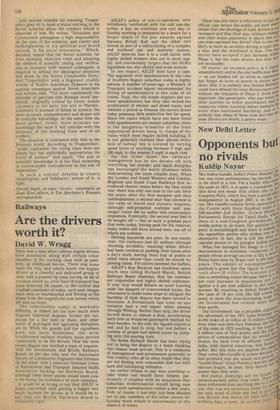East-West Relations
The hollowness of détente
Gerald Segal
A tragic split has occurred in the Soviet civil rights movement on the issue of whether or not the form currently taken by East-West contacts will lead to a genuine detente between East and West and encourage the development of a more liberal system in the Soviet Union. An important factor in the argument — which is personified by Academician Andrei Sakharov, the inventor of the Soviet H-bomb, on the one hand and the eminent geneticist Zhores Medvedyev, supported by his brother the historian Roy, on the other — is the role of science, technology and industrial exchange.
In .Sakharov's view, which is supported on more general grounds by the writer Alek
sander Solzhenitsyn, the mere increase in trade and technological contacts, even though it is accompanied by more frequent meetings between the scientists of East and West, may simply strengthen the Soviet state and economy and therefore the Marxist-Leninist system. The result will be the further repres sion of all those in Russia, who, like themselves, seek the normal democratic liberties.
This view leads them to demand of the West that before western governments enter into long-term trade and technological deals at low interest rates they should require the Soviet government to grant elementary democratic rights to all Soviet citizens.
The basic philosophy of the Medvedyev brothers is that the current international trend is to be welcomed because it will lead to the gradual infiltration of liberal ideas, through Soviet scientists and technicians meeting their Western opposite numbers, into the ruling circles of the Soviet Union. Eventually, as all change in Russia must come from the top, this development will move some of the leaders to inaugurate a new 'Socialism with a Human Face.'
The curious thing about the Medvedyev thesis is that the brothers should still continue to hold it in spite of Zhores's own recent experiences. In 1970 he was incarcerated in a lunatic asylum in Russia for political reasons and was then allowed after an international campaign on his behalf to leave for London to work on genetics. He has since been deprived of his Soviet citizenship, although he had taken no part in any political activity, and so cannot return to his Russian home. Hardly a good augury for liberalisation as a result of contacts between the scientists of East and West.
Moreover, there are deeper reasons for doubting the Medvedyev thesis. The historical record is clear. From the time when the Americans by large aid programmes saved the early Soviet republic from famine in 1920, through the technological co-operation and industrial building programmes of the 'twenties and 'thirties to the lend-lease arrangements of the second world war, there has been a continuous American-Soviet association in the scientific, technological and industrial fields.
The process was only interrupted when the Soviets for ideological and political reasons of their own decided, for example, to arrange false trials for American and other engineers who were striving to build the plant necessary for the first five-year plan, or to impose Lysenkoism on genetics, so making East-West contacts in this field impossible. A pretty accurate assessment of the American contribu tion was that given by Joseph Stalin to the American ambassador Averell Harriman in June 1944. Harriman quotes Stalin to the effect that about two thirds of all the large industrial enterprises in the Soviet Union (he had in mind the Gorky Automobile Works which was built by Ford) had been constructed with US help or technical assistance. And this quotation from Stalin leaves out of account the contribution made by other western countries.
The middle 'fifties and early 'sixties saw the emergence of the Pugwash conferences which fostered intimate meetings between some of the most.eminent scientists of the West and the Communist bloc. So far as one can check, no meaningful results ever emerged from them. The only useful achievement of the period, the banning of nuclear tests in the atmosphere in 1963, was the result of some inspired thinking by Sakharov himself and he was never allowed to leave Russia. Moreover it was at the very height of the fame of the Pugwash movement that the Cuban crisis and the American-Soviet nuclear confrontation of 1962 took place.
There is no reason to believe that the current 'détente' which so far is nothing more than an attempt to increase trade and WestEast scientific-technological deals will break the pattern.
On the contrary. It was precisely in January last year when there was much talk in the West about the new breakthrough in international relations and smug commentators talked glibly about how the Soviet need for Western science and technology would lead them to accept free contacts between the scientists themselves that the Soviet Communist Party laid down the ideological guidelines for all Soviet scientists — natural and social scientists — who would come into contact with their western opposite numbers. It came in the form of an article in Pravda by the Head of the Central Committee's Science Department S. Tra_peznikov and bearing the title, 'The Horizons of Science are the Horizons of Communism.' According to Trapeznikov, "only socialism and communism open up for the scientist and for man in general unprecedented scope for the fullest flowering of the personality and of its creative possibilities." And the scientist who is "formed under such conditions" is a "new type of scientist, flesh of the flesh of his own people, living and working for their welfare, an active ideological warrior, a direct participant in the universal struggle for the triumph of communism." This is surely warning enough to the Soviet scientist who enters into any kind of relationship personal or professional with his western counterpart that he is required to embody a creed which brooks no compromise. Lest anyone mistake his meaning, Trapeznikov goes on to issue a brutal warning to the Soviet scientist about the conduct which is expected of him. He writes, "Socialism and Communism presuppose a high responsibility on the part of the scientist, and clarity and forthrightness in his political and world outlook, in his social orientation." Which, decoded, means that the Soviet scientist, far from pursuing objective truth and adopting the method of scientific testing and verification in company with western colleagues, is required to defend the ideological positions laid down by the Soviet Communist Party. And Trapeznikov with a dogmatic crudity worthy of Stalin's henchman Zhdanov in his postwar campaigns against Soviet musicians and writers adds, "The more consistently the principle of partyism (the Russian word 'partiinost' originally coined by Lenin means Allerence to the party line and to MarxistLeninism) is pursued in future in science, the more accurate, comprehensive and deeper will be scientific knowledge. At the same time the more perfect, richer, more accurate our knowledge the more it will coincide with the interests of the working class and of all workers."
The situation is contrasted with that in the Western world. According to Trapeznikov, "under capitalism the ruling class does not simply buy but undividedly appropriates, the fruits of science" and again, "the aim of scientific knowledge is in the final reckoning in irreconcilable contradiction to the aim of imperialism." In such a context detente is clearly meaningless and Sakharov, aware of it, is right.
Gerald Segal, an expe7 :mced c nmentator on East-West affairs, is The Spectator's Brussels correspondent.



































 Previous page
Previous page